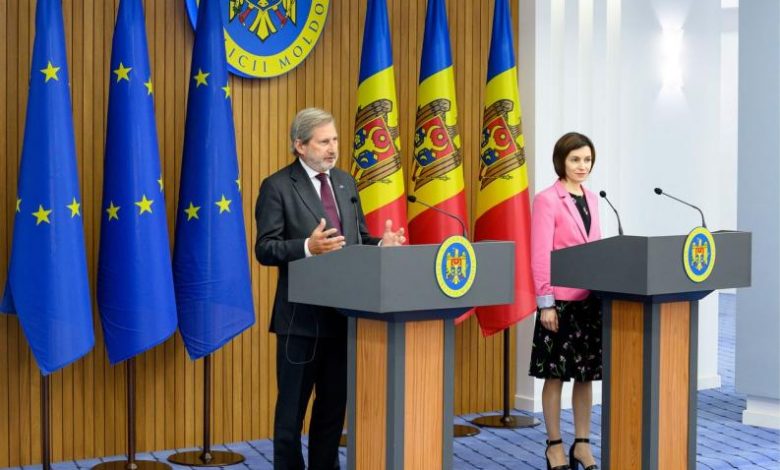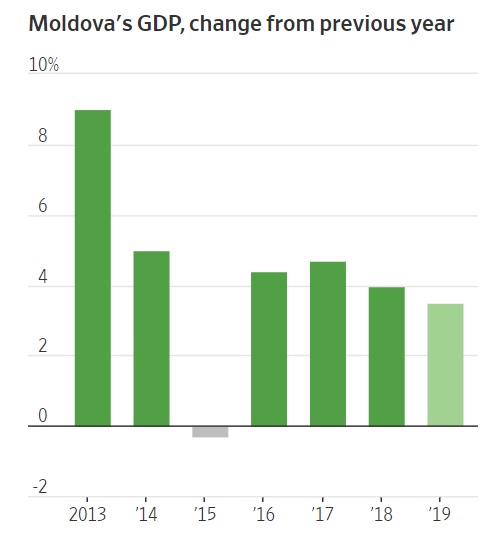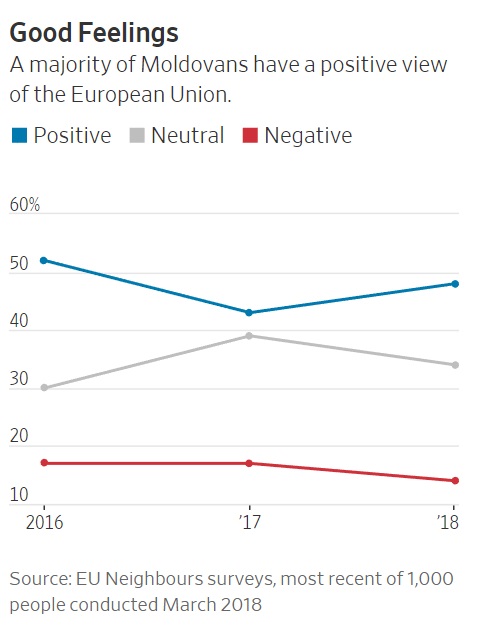The Wall Street Journal: Tiny Moldova Fears Russia is Playing a Long Game

CHISINAU, Moldova—Moldova’s new Prime Minister Maia Sandu has struck a balance between Russia and the West over how to put her tiny nation back on its feet—at least for now.
Russia has backed a series of leaders in former Soviet bloc states who have shied away from moving closer to Europe and stuck close to Moscow, strengthening a chain of states buffering Russia.
Yet so far it is doing little to check Ms. Sandu, who took office in June after forming an unlikely coalition government between her ACUM bloc, which favors joining the European Union, and the Socialist Party, which favors closer ties with Moscow. Ms. Sandu, a Harvard-educated former adviser to the World Bank, says her government will begin work on a badly needed overhaul to clean up corruption.
“This is a window of opportunity that we have now,” Ms. Sandu said in an interview with The Wall Street Journal. “I very much hope that we’ll work hard to make it a new beginning.”
Moldova has long been a focal point for Russia’s anxieties over the EU’s advance into the old Soviet bloc. The Kremlin already has troops on the ground in Transnistria, the thin sliver of land along its border with Ukraine that for decades has had complicated relations with Russia. The breakaway region has its own police force, currency and postal service catering to a large population of ethnic Russians.

In a statement, Russia’s foreign ministry pointed to strong cultural and historical ties between Russia and Moldova and said it had worked hard to resolve the conflict between Moldova and Transnistria. It was because of Russia, it said, that the armed phase of the dispute was ended in the early 1990s and a platform for negotiations established.
However, because of Russia’s hardball tactics elsewhere in the region, Ms. Sandu and other Moldovans question the Kremlin’s long-term intentions in Transnistria and Moldova itself.

In eastern Ukraine, Moscow is backing pro-Russian separatists in a slow-burning conflict that followed the Kremlin’s annexation of the Crimean Peninsula and has claimed 13,000 lives since 2014. In neighboring Belarus, the Kremlin is increasing pressure to integrate the two countries into a formal union, effectively dissolving Belarus into Russia.
Further south in Georgia, relations with Moscow have long frayed over Russian support from breakaway regions where Russia still stations troops. Georgia’s president last week accused Moscow of meddling in its internal affairs after a Russian politician briefly took the chair in the Georgian parliament, triggering days of unrest, including an attempt to storm the chamber.
In the Balkans, too, Russian is trying to limit the spread of North Atlantic Treaty Organization and the EU by stirring political and social divisions, analysts said.
“There is no other case in the region, when during a political crisis occurring in a country, the U.S., EU and Russia reached a common position that benefits all sides,” said Denis Cenusa, a Moldovan political scientist and a researcher at Justus Liebig University Giessen in Germany.
“As a rule, Russia is at odds with the West,” he said, making the apparent detente in Moldova all the more unusual.
Russia, the EU and the U.S. all applauded when wealthy oligarch Vladimir Plahotniuc, former chairman of the Democratic Party and one of the country’s most powerful men, agreed to step aside after his party unexpectedly took control of government at the height of the postelection deadlock.
The EU said it was ready to work with the legitimate government of Moldova. Russia’s Foreign Ministry said it was satisfied with the peaceful resolution of the crisis and was looking forward to the new government taking steps to improve cooperation between Russia and Moldova.
The U.S. State Department congratulated all sides and called for restraint moving forward.
“We all had the same assessment that a government needs to be formed,” EU Commissioner Johannes Hahn said in an interview during a visit to Chisinau on June 19. “Nobody can afford to have a destabilized Moldova in our neighborhood.”
Russia, though, maintains the upper hand. Through its supporters in the Socialist Party, to which the country’s president belongs, it can still shape what happens in Moldova, some analysts say, and ultimately bring down the government.
Vladimir Cebotari, deputy president of Mr. Plahotniuc’s Democratic Party, said the different groups in the new government were “geopolitically too different” for it to survive.
Dmitri Trenin, director of the Carnegie Moscow Center, said with the oligarch Mr. Plahotniuc out of the way, “the West and Russia have no compelling reason to collaborate” any further.
Immediate flashpoints could include pushing stronger ties to Europe or promoting further restrictions on the use of the Russian language in Moldova, which is closer culturally to neighboring Romania. In 2018, Moldova introduced a so-called anti-propaganda law that effectively bans Russian TV and radio broadcasts.
Keeping the new administration intact in this tinderbox environment will be a difficult balancing act.
Andrei Nastase, Moldova’s deputy prime minister, said Ms. Sandu and the pro-Russian Socialist Party would have to deliver rewards for both sides. Vlad Batrincea, who is president of the Socialist Party group in parliament, said the two factions had decided to place a moratorium on their ideological and political differences.
Ms. Sandu, who as prime minister heads the government, acknowledged the alliance between her anticorruption movement and the Socialist Party was “not a natural one” and it was unclear how long the partnership would last. She said she had made clear to Russian authorities her government would promote what she called “Moldova’s EU path.”
She also said she suspected Russia’s support for her broadly pro-Europe coalition was the only way to ensure a role for the Socialist Party, which she described as “close to the Kremlin.”
Ms. Sandu said, only time would tell. “If there are other reasons, I guess we will find out soon.”
—Laurence Norman in Brussels contributed to this article.
Amplification
Russia’s Foreign Ministry said in a statement that it has worked to resolve tensions between Moldova and Transnistria, a breakaway region along Moldova’s border where Moscow has stationed troops. An earlier version of this article omitted the ministry’s statement. (June 28, 2019)
